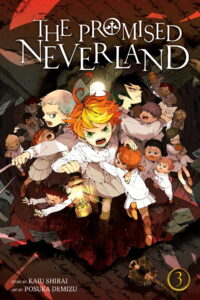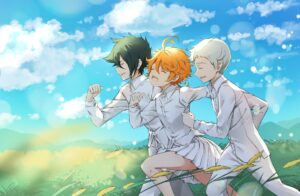Concept of Limited Freedom in a Micro Scale.
The Promised Neverland and Freedom
By Kutay Kuzucu

The Promised Neverland, a manga by Kaiu Shirai and a TV Series (2019-2021), explores the concept of limited freedom in a micro scale. Set in a world where humans and demons made a promise to end their war, the story reveals a dark truth. While the promise banished demons from the human world, it resulted in the existence of human farms in the demon world, where humans are raised as livestock for demons to consume. The manga begins in an orphanage that appears to be a safe haven for the children residing there, granting them almost every freedom except for one rule: they must not leave the premises.
The orphans, including the intelligent trio Norman, Emma, and Ray, excel in their exams and eagerly anticipate adoption. However, their perception of the orphanage is shattered when they discover the fate that awaits them and their fellow children – being fed to demons. Determined to escape, they face numerous challenges along the way. Ultimately, Emma manages to secure their freedom and renegotiates “The Promise,” but at the cost of her own memory.
The Promised Neverland parallels our own reality by highlighting the limitations and costs associated with freedom. From the moment we are born, we are thrust into a societal system that expects us to make certain choices. We must decide between pursuing higher education or entering the workforce at an early age, and even within the realm of education, we face choices that come with sacrifices. Each freedom we acquire in society is accompanied by costs, and there are inherent limits to our freedom.
We are not free to travel outside our countries without adhering to procedures and incurring expenses. We are not free to act without consequences, and we cannot live in society if we refuse to conform. Having differing viewpoints can lead to social ostracization, while rejecting low-paying jobs often results in deprivation. Even attempting to isolate oneself from society and live independently in a remote corner of the world is fraught with risks, as the lack of human connection and societal support leaves one vulnerable to misfortune.
Furthermore, society has domesticated us, shaping us into beings dependent on its structures. Without the support and resources provided by society, we are ill-equipped to survive alone in the wild. In a way, we become like house cats instead of lions, unable to fend for ourselves in untamed environments.
In conclusion, The Promised Neverland delves into the notion of limited freedom on a small scale. It reveals the consequences and boundaries associated with freedom, drawing parallels to our own reality. Each freedom we acquire comes at a cost, and deviating from societal expectations can lead to isolation and vulnerability. The manga serves as a reminder of the complex nature of freedom and the limitations inherent in our lives.

